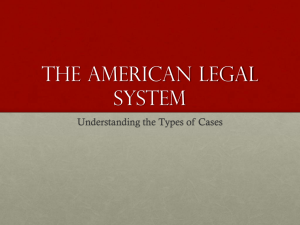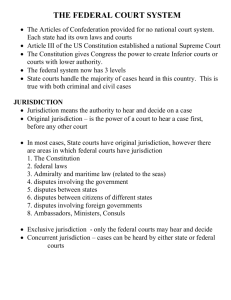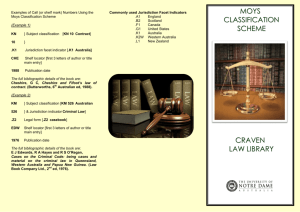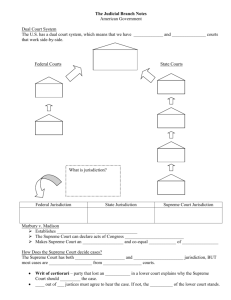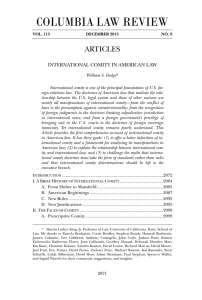Brief Of International Law And Jurisdiction Professors As Amici
advertisement
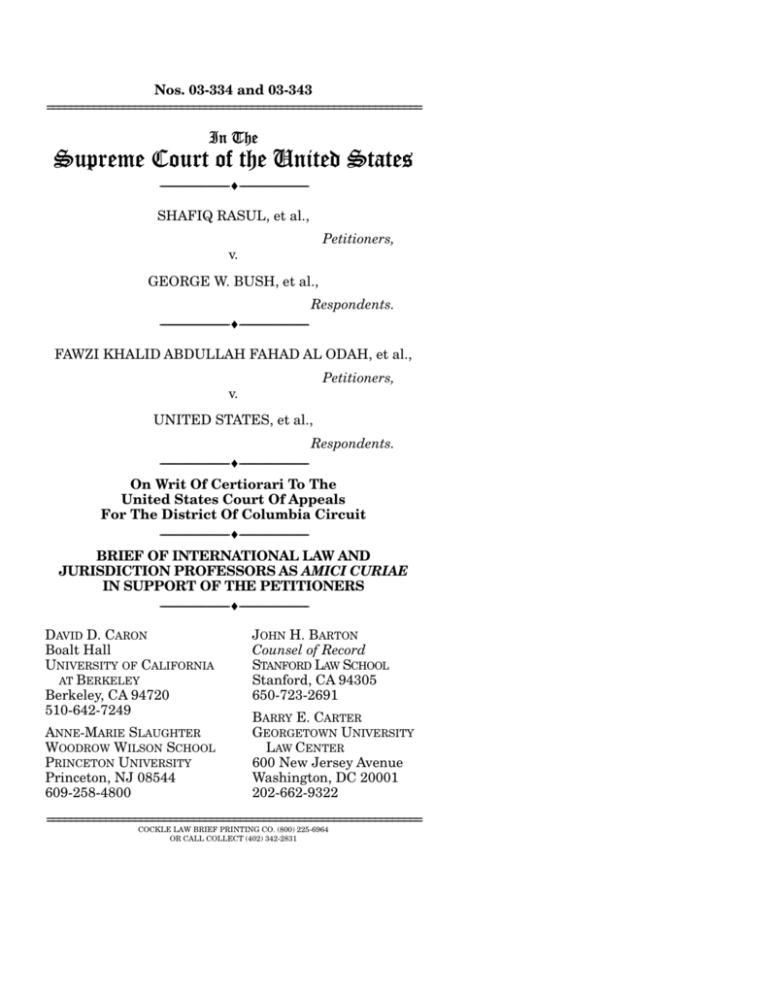
Nos. 03-334 and 03-343 ================================================================ In The Supreme Court of the United States ---------------------------------♦--------------------------------SHAFIQ RASUL, et al., Petitioners, v. GEORGE W. BUSH, et al., Respondents. ---------------------------------♦--------------------------------FAWZI KHALID ABDULLAH FAHAD AL ODAH, et al., Petitioners, v. UNITED STATES, et al., Respondents. ---------------------------------♦--------------------------------On Writ Of Certiorari To The United States Court Of Appeals For The District Of Columbia Circuit ---------------------------------♦--------------------------------BRIEF OF INTERNATIONAL LAW AND JURISDICTION PROFESSORS AS AMICI CURIAE IN SUPPORT OF THE PETITIONERS ---------------------------------♦--------------------------------DAVID D. CARON Boalt Hall UNIVERSITY OF CALIFORNIA AT BERKELEY Berkeley, CA 94720 510-642-7249 ANNE-MARIE SLAUGHTER WOODROW WILSON SCHOOL PRINCETON UNIVERSITY Princeton, NJ 08544 609-258-4800 JOHN H. BARTON Counsel of Record STANFORD LAW SCHOOL Stanford, CA 94305 650-723-2691 BARRY E. CARTER GEORGETOWN UNIVERSITY LAW CENTER 600 New Jersey Avenue Washington, DC 20001 202-662-9322 ================================================================ COCKLE LAW BRIEF PRINTING CO. (800) 225-6964 OR CALL COLLECT (402) 342-2831 i TABLE OF CONTENTS Page TABLE OF AUTHORITIES ........................................ ii INTEREST OF THE AMICI CURIAE........................ 1 STATEMENT .............................................................. 1 SUMMARY OF THE ARGUMENT ............................ 2 ARGUMENT ............................................................... 3 I. The increasingly international activity of the United States government counsels in favor of this Court’s review of certain extraterritorial actions of the United States executive ..... 3 This Court can take jurisdiction over the prisoners at Guantanamo consistently with the evolution of the Constitutional and international law concerns underlying judicial hesitation at reviewing international activity ............................ 5 A. The contemporary principles of comity .... 7 B. The contemporary separation of powers doctrine ..................................................... 13 CONCLUSION............................................................ 17 II. ii TABLE OF AUTHORITIES Page CASES A. Ahlström OY v. E.C. Commission (“Wood Pulp”), 1988 E.C.R. 5193 .............................................................. 8 Atkins v. Virginia, 536 U.S. 304 (2002)............................. 13 Balzac v. Puerto Rico, 258 U.S. 298 (1922) ......................... 6 Banco Nacional de Cuba v. Sabbatino, 376 U.S. 398 (1964) ................................................................................ 9 Brenner v. European Union Treaty (Judgment of the Maastricht Treaty), [1994] 1 C.M.L.R. 57 (Bundesverfassungsgericht 1993) ................................. 16 Carlsen v. Rasmussen [1999] 3 C.M.L.R. 854 (Danish Supreme Court 1998) ..................................................... 16 Christopher v. Harbury, 536 U.S. 403 (2002) ..................... 4 Commission v. Council (Energy Star Agreement), 1 E.C.R. 12049 (2002)........................................................ 15 Cook v. The Queen, [1998] 2 S.C.R. 597 (Can.) ................. 10 Dames & Moore v. Regan, 453 U.S. 654 (1981) ............ 5, 14 Dorr v. United States, 195 U.S. 138 (1904) ......................... 6 Downes v. Bidwell, 182 U.S. 244 (1901).............................. 6 Grutter v. Bollinger, 123 S.Ct. 2325 (2003)....................... 13 Hartford Fire Ins. v. California, 509 U.S. 764 (1993) ...................................................................... 8, 9, 10 Hawaii v. Mankichi, 190 U.S. 197 (1903) ........................... 6 International Agreement on Natural Rubber, 1979 E.C.R. 2871 ..................................................................... 15 iii TABLE OF AUTHORITIES – Continued Page Internationale Handelsgesellschaft mbH v. Einfuhrund Vorratsstelle für Getreide und Futtermittel, [1974] 2 C.M.L.R. 540 (Bundesverfassungsgericht)....... 16 Johnson v. Eisentrager, 339 U.S. 763 (1950) ...................... 5 Juragua Iron Co., Ltd. v. United States, 212 U.S. 297 (1909) ....................................................................... 14 Kuwait Airways Corp. v. Iraqi Airways Co., (Nos. 4 & 5) [2002] 2 A.C. 883 ...................................................... 9 Lawrence v. Texas, 123 S.Ct. 2472 (2003) ......................... 13 Loizidou v. Turkey, (1995) 20 Eur. H.R.Rep. 99 (Eur. Ct. H.R.) ................................................................ 11 Ocampo v. United States, 234 U.S. 91 (1914) ..................... 6 Palko v. Connecticut, 302 U.S. 319 (1937) ........................ 12 R. v. Secretary of State for Foreign Affairs, ex parte World Development Movement Ltd., [1995] 1 All E.R. 611, 1 W.L.R. 386 (Q.B.D. 1994)............................ 15 Regina v. Bow Street Metropolitan Stipendiary Magistrate Search Term End and Others, Ex Parte Pinochet Ugarte, (No. 3) [2000] 1 A.C. 147, 160..................................................................................... 9 Regina v. Horseferry Road Magistrates’ Court (Ex Parte Bennett), [1994] 1 App. Cas. 42 (H.L. 1993)........ 10 Reid v. Covert, 354 U.S. 1 (1957) ......................................... 6 Rochin v. California, 342 U.S. 165 (1952)......................... 12 Schoenbaum v. Firstbrook, 405 F.2d 200 (2d Cir. 1968).................................................................................. 8 State v. Ebrahim, 31 I.L.M. 888 (South Africa 1992)....... 11 iv TABLE OF AUTHORITIES – Continued Page United States v. Aluminum Co. of Am., 148 F.2d 416 (2d Cir. 1945) ............................................................. 8 United States v. Balsys, 524 U.S. 666 (1998) ...................... 4 United States v. Rezaq, 134 F.3d 1121 (D.C. Cir. 1998).................................................................................. 9 United States v. Toscanino, 500 F.2d 267 (2d Cir. 1974).................................................................................. 4 United States v. U.S. Dist. Court for Eastern Dist. of Mich., 407 U.S. 297 (1972) ......................................... 14 United States v. Usama Bin Laden, 92 F.Supp.2d 189 (S.D.N.Y. 2000) .......................................................... 9 United States v. Verdugo-Urquidez, 494 U.S. 259 (1990) .................................................................. 12, 13, 14 Re the Application of Wünsche Handelsgesellschaft, [1987] 3 C.M.L.R. 225 (Bundesverfassungsgericht 1986) ................................................................... 16 Youngstown Sheet & Tube Co. v. Sawyer, 343 U.S. 579 (1952) ....................................................................... 15 CONSTITUTIONAL PROVISIONS Fifth Amendment ............................................................... 12 Fourteenth Amendment..................................................... 12 OTHER AUTHORITIES 22 U.S.C. § 2370(e)(2) (2000) ............................................. 10 28 U.S.C. § 2241(c)(3)......................................................... 13 1949 Geneva Convention Relative to the Treatment of Prisoners of War, Aug. 12, 1949, 6 U.S.T. 3116......... 16 v TABLE OF AUTHORITIES – Continued Page Antiterrorism Act of 1990, 18 U.S.C. §§ 2331-2339 (2000) ................................................................................ 8 Antiterrorism and Effective Death Penalty Act of 1996, 110 Stat. 1214 (West 1996) .................................... 8 Destruction of Aircraft or Aircraft Facilities Act, 18 U.S.C.A. § 32 (2000) ......................................................... 9 Hostage Taking Act, 18 U.S.C.A. § 1203 (West 2002).................................................................................. 9 Torture Victim Protection Act of 1991, 106 Stat. 73 (West 1992) ....................................................................... 9 Military Order of Nov. 13, 2001: Detention, Treatment, and Trial of Certain Non-Citizens in the War Against Terrorism, 66 Fed. Reg. 57833 (Nov. 16, 2001).................................................................. 3 RESTATEMENT (THIRD) OF FOREIGN RELATIONS LAW § 402 & 403 (1986)............................................................ 8 European Convention for the Protection of Human Rights and Fundamental Freedoms, Nov. 4, 1950, 213 U.N.T.S. 221..............................................................11 International Covenant on Civil and Political Rights, Dec. 16, 1966, 999 U.N.T.S. 171, 6 I.L.M. 368 (1967) ........................................................................11 1 INTEREST OF THE AMICI CURIAE The amici, International Law and Jurisdiction Professors, include John H. Barton, the George E. Osborne Professor of Law Emeritus at Stanford University, David Caron, the C. William Maxeiner Distinguished Professor of Law at the University of California, Berkeley, Barry E. Carter, Professor of Law at Georgetown University and Anne-Marie Slaughter, Dean of the Woodrow Wilson School at Princeton University. All are academic international law experts who have devoted significant attention to the jurisdictional aspects of national and international law in areas such as international criminal law, interna1 tional economic law, and human rights. Professors Barton and Carter are members of the bar of this Court. The amici do not seek to comment on the merits of any claims or defenses. Rather, they wish to raise to this Court the need to extend judicial review to certain extraterritorial actions by the United States government and the feasibility of doing so consistently with the Constitution and with the demands of international law. ---------------------------------♦--------------------------------STATEMENT Petitioners are detained at the U.S. Naval Base at Guantanamo Bay by U.S. armed forces. With one exception, they have been imprisoned without recourse to court 1 No counsel for any party authored any part of this brief. No person other than the amici made a monetary contribution to the preparation or submission of this brief. The parties’ written consents to the filing of this brief have been filed with the Clerk. 2 2 process or access to counsel. The United States maintains exclusive authority and control over this Naval Base, which it occupies under a lease from the Government of Cuba. Protection against arbitrary detention is guaranteed by the United States Constitution, by virtually every nation’s domestic laws, and by international law. The United States government should not be entitled to ignore these legal requirements through an assertion that its activities in the area involved are not subject to the jurisdiction of U.S. federal courts. ---------------------------------♦--------------------------------SUMMARY OF ARGUMENT Both the Constitution and international law counsel in favor of this Court’s authority to review those extraterritorial activities of the United States government that involve fundamental rights protected by the Constitution and by international law. Changes in the international system have reshaped the traditional concerns of comity and of respect for the executive’s freedom of action in foreign policy that have historically led this Court to restrain the exercise of its power in the international and foreign policy context. In particular, the concerns of comity now permit and demand that this Court take jurisdiction and apply Constitutional 2 The person is Mr. David Hicks, as described in Neil A. Lewis, Taliban Detainee is Depressed, Lawyer Says, N.Y. Times, Dec. 18, 2003, at A29. 3 or international human rights principles. Similarly, concerns of foreign policy are met by exercising jurisdiction, but taking into account the appropriate foreign policy concerns. These concerns now require application of constitutional and human rights principles in a case involving international criminal law. ---------------------------------♦--------------------------------ARGUMENT I. The increasingly international activity of the United States government counsels in favor of this Court’s review of certain extraterritorial actions of the United States executive. The prisoners held at the United States Naval Base at Guantanamo are not the only persons who will be affected by the Court’s jurisdictional decision in this case. In the aftermath of September 11, 2001, it appears possible that the United States executive will establish its own special criminal court process, seeking to avoid the use of Article III judges and to use instead an executive form of review rather than an independent judicial review, such as that provided by this Court, Military Order of Nov. 13, 2001: Detention, Treatment, and Trial of Certain Non-Citizens in the War Against Terrorism, 66 Fed. Reg. 57833 (Nov. 16, 2001). This new process may be applied far beyond those captured in connection with the Afghanistan or Iraq actions, for the war on terrorism is likely to last indefinitely. Moreover, precedents set in this terrorism conflict may end up being applied as well to international narcotics or money-laundering offenses. International activity has already become increasingly important in the prosecution of 4 traditional crime within traditional courts. This is a result of the internationalization of crime itself and of the greater mobility of defendants. More and more, evidence collected in or a confession obtained in one jurisdiction is used in prosecutions in another jurisdiction. There is an important problem here if the evidence or confession is obtained in a way that is legitimate in one jurisdiction but not the other, especially if prosecution and evidence collection are designed to take advantage of such differ3 ences, and a serious human cost if, because of inaction by supervisors or courts, the evidence collection processes 4 sink below a lowest-common-denominator. For many of these activities, there will be no judicial supervision of the criminal law process unless review is extended to at least some international and extraterritorial activities. The United States, together with its allies, 5 is building a global criminal law system. As the executive 3 See, e.g., United States v. Balsys, 524 U.S. 666, 698 (1998) (recognizing that in the self-incrimination context close cooperation among authorities of different nations might require a greater willingness to take jurisdiction). 4 See, e.g., Christopher v. Harbury, 536 U.S. 403 (2002) (allegations of torture and murder by Guatemalan military officers who were also allegedly paid CIA agents in early 1990s); United States v. Toscanino, 500 F.2d 267 (2d Cir. 1974) (allegations of abduction by U.S. agents in Uruguay in 1973 for trial in United States). 5 See, e.g., CENTER FOR INTERNATIONAL CRIME PREVENTION, UNITED NATIONS OFFICE FOR FOOD AND DRUG CONTROL AND CRIME PREVENTION; GLOBAL REPORT ON CRIME AND JUSTICE III (Graeme Newman, ed., 1999). Writing in the Foreword, Pino Arlacchi, the Executive Director of the United Nations Office for Drug Control and Crime Prevention, stated “Crime and justice are no longer simply local or national issues. They are global concerns which require careful study and concerted international action.” 5 acts internationally in ways that are like those of domestic criminal law enforcement, and as international issues become more important in daily life, Constitutional freedoms may become meaningless unless appropriate judicial restraints are applied. Criminal law is not the only internationalizing area. A variety of economic issues are now being dealt with internationally, and they are becoming so significant as to implicate the heart of our national economic activity. As our economy globalizes, it is again essential to apply legal restraints to the executive. For business to function efficiently, its leaders must be able to have confidence in the existence of an orderly regime of trade regulation that maintains the predictability of judicial control. Again, judicial review of some foreign policy actions will be essential. II. This Court can take jurisdiction over the prisoners at Guantanamo consistently with the evolution of the Constitutional and international law concerns underlying judicial hesitation at reviewing international activity. The Court has found it difficult to define a standard for extending jurisdiction beyond the nation’s borders, and, as stated by then-Justice Rehnquist, the decisions in this area “offer little precedential value,” Dames & Moore v. Regan, 453 U.S. 654, 661 (1981). Thus, Johnson v. Eisentrager, 339 U.S. 763, 784 (1950) suggests that the Constitution stops at 6 the water’s edge: “extraterritorial application of organic law would have been so significant an innovation in the practice of governments that, if intended or apprehended, it could scarcely have failed to excite contemporary comment. Not one word can be cited.” In contrast, the later case, Reid v. Covert, 354 U.S. 1, 7 (1957) states that “The language of Art. III, § 2 manifests that constitutional protections for the individual were designed to restrict the United States Government when it acts outside of this country as well as here at home.” The Court’s hesitation appears to reflect two groups of factors. The first, although not applicable in this case, is comity, or respect for the traditional territorially-based balance of jurisdiction between U.S. and foreign courts. This is not only a question of conflict of laws; it is also a question of whether the specifics of the U.S. Bill of Rights are appropriate in areas governed by different legal 6 traditions, as reflected for example in the Insular Cases, 6 E.g., Balzac v. Puerto Rico, 258 U.S. 298 (1922) (jury trial in Puerto Rico); Ocampo v. United States, 234 U.S. 91 (1914) (grand jury in Philippines); Dorr v. United States, 195 U.S. 138 (1904) (jury trial in Philippines); Hawaii v. Mankichi, 190 U.S. 197 (1903) (grand jury and jury trial in Hawaii); Downes v. Bidwell, 182 U.S. 244 (1901) (revenue provisions in Puerto Rico). In Dorr, for example, the concern was that the annexed territory used European civil law with procedures quite different from those of the Anglo-American procedures envisioned in the Bill of Rights. Should, for example, an accused in such a region have a right to a jury? In 1904, this Court answered with a no, in Dorr, 195 U.S. at 148: If the right to trial by jury were a fundamental right which goes wherever the jurisdiction of the Untied States extends . . . it would follow that, no matter what the needs or capacities of the people, trial by jury, and in no other way, must be formally established, although the result may be to work injustice and (Continued on following page) 7 which involved the standards to be applied to the territories acquired following the 1898 Spanish-American war. The second, quite different, group of factors reflects the separation of powers concerns about hampering the ability of the executive to operate effectively in international affairs. As will be shown below, courts worldwide are now interpreting the first group of factors to permit greater extraterritorial exercise of jurisdiction. Moreover, recognizing that law can increasingly be applied in some aspects of international relations, they are narrowing the areas within which executives have discretion and applying constitutional or human rights standards to executives in foreign policy actions in a growing number of contexts. A. The contemporary principles of comity Comity counsels concern over taking jurisdiction over activities outside the forum territory. It is normal, however, for a court to hear a case when the court has personal jurisdiction over the relevant defendants, and the facts involved in the dispute require it to consider extraterritorial provoke disturbance rather than to aid the orderly administration of justice . . . Again, if the United States shall acquire by treaty the cession of territory having an established system of jurisprudence, where jury trials are unknown, but a method of fair and orderly trial prevails under an acceptable and long-established code, the preference of the people must be disregarded, their established customs ignored and they themselves coerced to accept, in advance of incorporation into the United States, a system of trial unknown to them and unsuited to their needs. We do not think it was intended, in giving power to Congress to make regulations for the territories, to hamper its exercise with this condition. 8 actions. This happens all the time and is a basic situation for applying the principles of conflicts of laws, under which the court may apply foreign law, or in some cases, forum law, to the foreign issues. The Guantanamo case involves precisely this pattern – the U.S. government is the effective defendant, the questions involve consideration of foreign U.S. government actions, and the issues ultimately before the court are whether to apply U.S. law (e.g., the Bill of Rights), to apply foreign or international law, or to decline to hear the case and thus apply no law at all. Traditionally, courts have been willing to apply forum law to foreign issues when there is a domestic effect and when the forum law reflects universal principles. The United States has long recognized the first of these principles, at least since Judge Learned Hand’s opinion in United States v. Aluminum Co. of Am., 148 F.2d 416 (2d Cir. 1945). There are now classic examples in both antitrust, Hartford Fire Ins. v. California, 509 U.S. 764 (1993), and securities law, Schoenbaum v. Firstbrook, 405 F.2d 7 200 (2d Cir. 1968). This antitrust position has been followed abroad, Cases 89/85, 104/85, 114/85, 116-117/85 & 125-129/85, A. Ahlström OY v. E.C. Commission (“Wood Pulp”), 1988 E.C.R. 5193. Moreover, there are now many anti-terrorism statutes that criminalize actions abroad, e.g., the Antiterrorism Act of 1990, 18 U.S.C. §§ 2331-2339 (2000) (as amended); the Antiterrorism and Effective Death Penalty Act of 1996, 7 See generally RESTATEMENT (THIRD) OF FOREIGN RELATIONS LAW §§ 402 & 403 (1986), providing bases for jurisdiction to prescribe and defining a balancing test limitation on that jurisdiction. 9 110 Stat. 1214 (West 1996); the Destruction of Aircraft or Aircraft Facilities Act, 18 U.S.C.A. § 32 (2000); and the Hostage Taking Act, 18 U.S.C.A. § 1203 (West 2002). Recent statutes also authorize damages against torturers abroad, Torture Victim Protection Act of 1991, 106 Stat. 73 (West 1992). Extraterritorial criminal statutes have now been the basis of U.S. criminal prosecutions based on extraterritorial activity, e.g., United States v. Rezaq, 134 F.3d 1121 (D.C. Cir. 1998); United States v. Usama Bin Laden, 92 F.Supp.2d 189 (S.D.N.Y. 2000). Some of the requirements of comity are incorporated 8 in the act of state doctrine. Reading the doctrines together, in certain cases, they counsel abstention from applying national or international law to activity, particularly that of foreign governments, taking place in a foreign jurisdiction and lead either to applying foreign law or to not hearing the case. Among the factors that affect the choice between abstention and jurisdiction are (1) a Congressional judgment that the national (U.S.) law should be applied extraterritorially and a clear conflict between the U.S. and the foreign principles, as reflected in Hartford Fire Ins., 509 U.S. at 798-99 (agreement in restraint of trade by United Kingdom insurance companies in the United Kingdom), (2) consideration of the balance of 8 See, e.g., Banco Nacional de Cuba v. Sabbatino, 376 U.S. 398 (1964); Regina v. Bow Street Metropolitan Stipendiary Magistrate Search Term End and Others, Ex Parte Pinochet Ugarte, (No. 3) [2000] 1 A.C. 147, 160 (H.L.) (act of state doctrine does not prevent extradition of Pinochet); Kuwait Airways Corp. v. Iraqi Airways Co., (Nos. 4 & 5) [2002] 2 A.C. 883 (H.L.) (rejecting application of the act of state doctrine when the result would be contrary to public policy). 10 factors favoring or disfavoring application of the U.S. law, again described in Hartford Fire Ins., 509 U.S. at 817-22 (dissenting opinion), and (3) a recognition that certain international principles, such as those governing expropriation or torture, are so important as to override concerns of offending the foreign jurisdiction, as required by 22 U.S.C. § 2370(e)(2) (2000) (Hickenloooper Amendment). This Court has been willing to take a broad approach to taking jurisdiction to apply antitrust principles extraterritorially – in this case, there is at least as strong an argument for taking jurisdiction and applying either U.S. law, e.g., the Bill of Rights, or international law such as international human rights law. As noted above, the defendant is before the Court. And there is good reason not to apply the act of state doctrine. There is no concern in this case with a conflict between U.S. law and local law, the balance of factors certainly favors applying U.S. law, and the U.S. law reflects global human rights principles. In providing jurisdiction to the U.S. federal courts in this case, this Court would follow a trend already paved by courts of other developed nations, many of which now review their own nation’s extraterritorial actions, including actions affecting foreign nationals. For example in Cook v. The Queen, [1998] 2 S.C.R. 597 (Can.), the Canadian Supreme Court suppressed statements that had been made to Canadian authorities by an American citizen in the United States without the Miranda warning required by the Canadian Charter of Rights. Governmental kidnapping abroad of New Zealand citizens, alleged to be criminals, was explicitly rejected by the House of Lords in Regina v. Horseferry Road Magistrates’ Court (Ex Parte Bennett), [1994] 1 App. Cas. 42 (H.L. 1993). South Africa’s abduction of a South African national was struck down in 11 State v. Ebrahim, 31 I.L.M. 888 (South Africa 1992). And the European Court of Human Rights similarly found it had jurisdiction to review Turkey’s extraterritorial action (in Turkish Cyprus) against a Greek-Cypriot, Loizidou v. Turkey, (1995) 20 Eur. H.R.Rep. 99 (Eur. Ct. H.R.) (decision on preliminary objections). Courts have been emboldened to take such jurisdiction in part because of the evolution of a set of human rights principles which are broadly accepted (and are very similar to the principles of the Constitution and the Bill of Rights). Among the most important are the European Convention for the Protection of Human Rights and 9 Fundamental Freedoms, Nov. 4, 1950, 213 U.N.T.S. 221, and the International Covenant on Civil and Political Rights, Dec. 16, 1966, 999 U.N.T.S. 171, 6 I.L.M. 368 (1967) entered into force for the United States September 8, 1992, subject to Declarations. Decisions under these Conventions are becoming part of a global common law, a body of interpretive jurisprudence on human rights, frequently citing U.S. Supreme Court decisions. Both 10 contain strong statements of the habeas corpus principle. 9 This is the Convention adopted by the United Kingdom in 1998 to provide a set of principles for use in judicial review of both executive and Parliament actions, Human Rights Act 1998 (1998 Chapter 42). 10 See, e.g., European Convention for the Protection of Human Rights and Fundamental Freedoms at Article 5 (4) (“Everyone who is deprived of his liberty by arrest or detention shall be entitled to take proceedings by which the lawfulness of his detention shall be decided speedily by a court and his release ordered if the detention is not lawful.”); International Covenant on Civil and Political Rights at Article 9 (4) (“Anyone who is deprived of his liberty by arrest or detention shall be entitled to take proceedings before a court, in order that the courts (Continued on following page) 12 It is premature to argue to the Court what body of law should be chosen to review the actions of the United States government in this case, since the only issue before the Court at this time is whether to take jurisdiction. But it should be noted that there are several choices available and consistent with international comity principles: the Bill of Rights, a fundamental rights approach as used in the Insular cases, or international human rights principles (which can be viewed as a contemporary statement of fundamental rights jurisprudence). The Court has long recognized the need for flexibility in applying Constitutional protections abroad, e.g., United States v. VerdugoUrquidez, 494 U.S. 259, 277 (1990) (Kennedy, J. concurring), and has used due process as its basic source of flexibility for incorporating principles from other areas. Thus, the Court interpreted Fourteenth Amendment due process to incorporate portions of the Bill of Rights and to apply them to states, using its own judgment to decide which provisions of the Bill of Rights should thus be 11 incorporated. Similarly, when reviewing foreign actions of the United States executive, the Court could reasonably interpret the due process provision of the Fifth Amendment to incorporate an appropriate combination of Bill of Rights and international human rights norms. It has may decide without delay on the lawfulness of his detention and order his release if the detention is not lawful.”) 11 See, e.g., Rochin v. California, 342 U.S. 165 (1952) (invoking Fourteenth Amendment due process to limit the means usable by police officers to obtain data from an accused); Palko v. Connecticut, 302 U.S. 319 (1937) (refusing to extend the Fifth Amendment principle against double jeopardy to limit the right of states to appeal in criminal proceedings). 13 already considered and cited the body of international human rights law in interpreting Constitutional provisions, Lawrence v. Texas, 123 S.Ct. 2472, 2483 (2003) (privacy and homosexual acts); Atkins v. Virginia, 536 U.S. 304, 316 n. 21 (2002) (death penalty and mentallyretarded offenders); Grutter v. Bollinger, 123 S.Ct. 2325, 2347 (2003) (affirmative action) (Ginsburg, J, concurring). In this case, application of international norms may be required under the habeas corpus statute, which refers to “custody in violation of the laws or Constitution or treaties of the United States,” 28 U.S.C. § 2241(c)(3) (emphasis added). Even if the international norms were not treated as self-executing in U.S. law, i.e., not directly applicable by courts, the Court could still regard them as declaratory of fundamental rights or as a source to use in interpretation of a due process standard in an international context, just as it uses the Bill of Rights to interpret due process in the domestic context. This leaves the Court a logical basis to avoid application of the international norms in circumstances in which they might be feared to contradict U.S. norms. B. The contemporary separation of powers doctrine As recognized in United States v. Verdugo-Urquidez, 494 U.S. 259 (1990), the reality of anarchy in the international order requires that the executive be free to act internationally in certain ways that would be inappropriate domestically. For better or for worse, we live in a world of nation-states in which our Government must be able to “functio[n] effectively in the company of sovereign nations.” . . . Some who violate our 14 laws may live outside our borders under a regime quite different from that which obtains in this country. Situations threatening to important American interests may arise halfway around the globe, situations which in the view of the political branches of our Government require an American response with armed force. If there are to be restrictions on searches and seizures which occur incident to such American action, they must be imposed by the political branches through diplomatic understanding, treaty, or legislation. 494 U.S. at 275 (citation omitted). The President’s power as commander-in-chief is thus one to which the Court owes deference. The Court is hesitant to restrict the executive’s ability to collect intelli12 gence information or to restrict international bargains such as those involved in freeing the hostages in Iran, as approved in Dames & Moore. Similarly, it is inappropriate to require the government to pay damages for property destroyed in war, regardless of whether the destruction is foreign or domestic, Juragua Iron Co., Ltd. v. United States, 212 U.S. 297 (1909). And, in a slightly different context, it is essential to permit top government leaders to 12 See United States v. U.S. Dist. Court for Eastern Dist. of Mich., 407 U.S. 297 (1972) (making intelligence information, collected without judicial supervision, inadmissible in a domestic proceeding if collected against a domestic organization with no foreign ties, but making no holding about similar evidence collected against a foreign citizen or government). 15 be free from the threat of arrest in order that they can 13 carry out their activities. But the scope of deference is properly limited. The border between the portions of international affairs that remain anarchic and those that can be ordered legally is shifting – and each component shifted into the legallyordered side, and then recognized by courts as shifted, is a benefit to the international rule of law. For example, the international trade regime created by economic globalization and regulated by the World Trade Organization is now so significant that it would be inappropriate to treat the President’s actions in international trade as beyond review, save in those areas where such executive flexibility is clearly envisaged by international or domestic law. Law – rather than international political bargaining – can now be increasingly applied to resolve international disputes This increased legalization expands on the long standing principle of United States law that Constitutional procedures must be respected in the foreign policy area. Youngstown Sheet & Tube Co. v. Sawyer, 343 U.S. 579 (1952). The European Court of Justice has acted several times to ensure that the European Union institutions follow the procedures and competences embodied in their foundation documents in conducting international diplomacy, e.g., Case 281/01, Commission v. Council (Energy Star Agreement), 1 E.C.R. 12049 (2002); Case 1/78, International Agreement on Natural Rubber, 1979 E.C.R. 2871. And in R. v. Secretary of State for Foreign 13 See Case Concerning Arrest Warrant of April 11, 2000 (Democratic Republic of the Congo v. Belgium), 2002 I.C.J. 1 (Feb. 14). 16 Affairs, ex parte World Development Movement Ltd., [1995] 1 All E.R. 611, 1 W.L.R. 386 (Q.B.D. 1994), the British court reviewed a foreign assistance decision for consistency with the authorizing statute. Among the more legalized areas is the international exercise of criminal enforcement procedures and of treatment of prisoners, reflecting the international human rights principles discussed above as well as international humanitarian law principles such as those embodied in the 1949 Geneva Convention Relative to the Treatment of Prisoners of War, Aug. 12, 1949, 6 U.S.T. 3116. As suggested by the cases already cited, courts have been willing to apply these principles against their own governments. Courts, including the German Constitutional Court and the Danish Supreme Court, have gone even further to require that their nations participate in international institutions only if these institutions are structured in ways that respect human rights, Brenner v. European Union Treaty (Judgment of the Maastricht Treaty), [1994] 1 C.M.L.R. 57 (Bundesverfassungsgericht 1993); Re the Application of Wünsche Handelsgesellschaft, [1987] 3 C.M.L.R. 225 (Bundesverfassungsgericht 1986); Internationale Handelsgesellschaft mbH v. Einfuhr-und Vorratsstelle für Getreide und Futtermittel, [1974] 2 C.M.L.R. 540 (Bundesverfassungsgericht); Carlsen v. Rasmussen [1999] 3 C.M.L.R. 854 (Danish Supreme Court 1998). Deference to the executive in foreign policy actions may require that the executive have significantly greater latitude in the international context than in the domestic context, and the possibility of granting that latitude makes it more feasible for the Court to accept jurisdiction 17 in foreign policy cases. But only if it does rule that U.S. federal courts have jurisdiction can the Court develop a jurisprudence governing the appropriate latitude that the executive should have. That latitude is properly narrow where individual rights are involved. There are now too many international contexts in which governing law is available – and its application essential to freedom – for the Court to forgo the opportunity for review. ---------------------------------♦--------------------------------CONCLUSION The future will almost certainly bring many extraterritorial detentions, criminal investigations, and criminal trials. Rights will be at risk unless these are supervised judicially. For detentions, criminal investigations, or trials of U.S. citizens or within the United States, it is logical and essential that the U.S. Bill of Rights norms apply. For similar actions abroad under U.S. control, the Court should require the executive to provide due process by taking jurisdiction and then applying a combination of the Bill of Rights and of global human rights norms. The Court may offer the executive significant flexibility in recognition of the executive’s needs in the foreign policy area – but it can only define that scope of flexibility and maintain its vital Constitutional role in a legal system increasingly affected by globalization if it grants jurisdiction to petitioners. For the executive to keep prisoners in 18 Guantanamo cannot preempt the operation of the Constitution with respect to those prisoners. Respectfully submitted, DAVID D. CARON Boalt Hall UNIVERSITY OF CALIFORNIA AT BERKELEY Berkeley, CA 94720 510-642-7249 ANNE-MARIE SLAUGHTER WOODROW WILSON SCHOOL PRINCETON UNIVERSITY Princeton, NJ 08544 609-258-4800 JOHN H. BARTON Counsel of Record STANFORD LAW SCHOOL Stanford, CA 94305 650-723-2691 BARRY E. CARTER GEORGETOWN UNIVERSITY LAW CENTER 600 New Jersey Avenue Washington, DC 20001 202-662-9322


